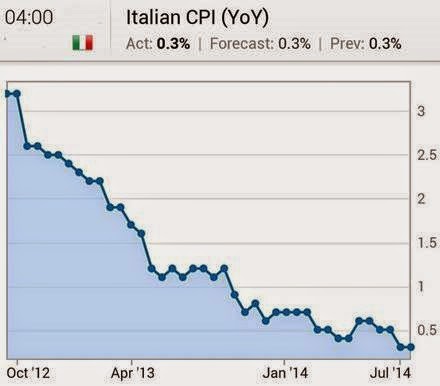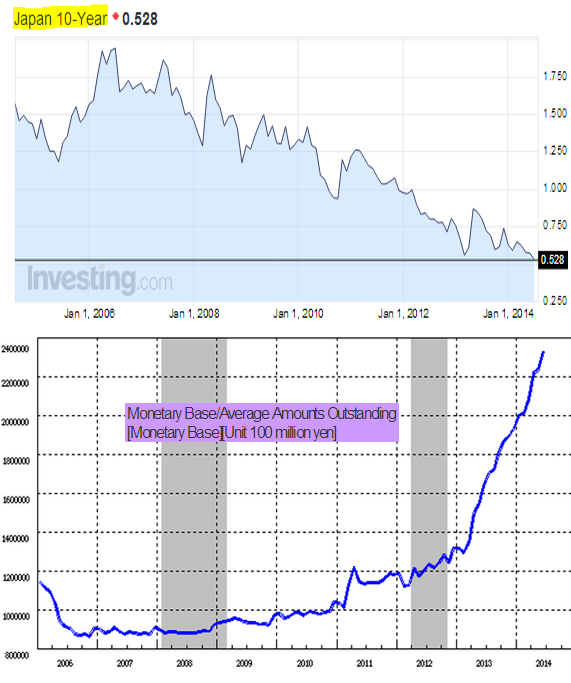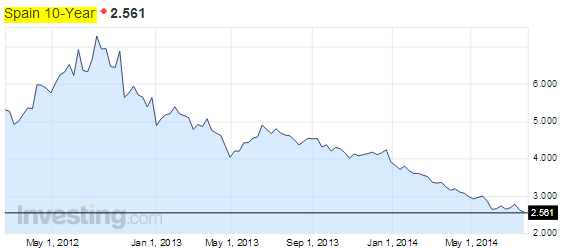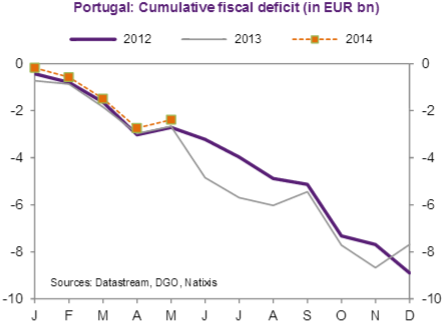In spite of weakening economic growth, persistent credit contraction, and dangerously low inflation rate in a number of member states (chart below), the ECB continues to resist calls for Fed-style outright securities purchases. Instead the central bank is betting on the recently announced TLTRO program (see post).

The key reason for avoiding outright quantitative easing is, supposedly, the ECB's fear of creating a moral hazard. With a ready buyer of government debt and low market rates, some member states would no longer focus on cutting deficits.
Natixis: - The ECB’s problem is that it does not want to create incentives for governments to refrain from correcting fiscal deficits or avoid improving their public finance situation. What is rejected by the ECB is the moral hazard that would result from the central bank buying government bonds.
Fair enough. But a recent report from Natixis argues that the combination of the TLTRO lending and the OMT backstop program creates conditions that are nearly identical to quantitative easing.
Any QE program aims to increase the monetary base (by raising banks' excess reserves) and to push down longer term interest rates via securities purchases. As an extreme example of this, consider Japan's massive QE effort (see post). Both objectives have been met: long-term rates are at ridiculously low levels (0.53% on 10-year JGBs) while the monetary base is at a record.

Similarly (though not to the same extent) the ECB's programs will mimic QE without actually buying any government securities. Here is how:
1. Long term rates across the Eurozone are already at incredibly low levels. The ECB's forward guidance, weak growth, and recent geopolitical risks have pushed German rates to new lows (see chart). On the other hand the OMT program, often called the "Draghi put", has suppressed periphery yields. Furthermore, with short-term rates near zero and low capital requirements to hold sovereign bonds, the euro area banks have been loading up on this paper in a massive carry trade - pushing yields even lower.
2. But what about increasing the monetary base? The expectations are that the TLTRO program will soon increase the Eurosystem balance sheet by as much as €700 billion. €300 billion of lending is expected to hit the banking system in September and the rest over the next couple of years. The monetary base will begin rising quickly.
The combination of the two items above is effectively QE. So how are the Eurozone member states reacting to this? Natixis argues that the QE-like environment has already created something of a moral hazard by encouraging these governments to pay less attention to their fiscal situation. If borrowing is easy and cheap, the temptation to keep on spending is too great for many politicians. 2014 deficits in a number of the member nations show minimal improvements.
Natixis: - The ECB accepts to go very far in the choice of expansionary monetary policies (very long-term repos [4-year TLTRO loans], de-sterilisation of the SMP [see post], forward guidance, purchases of ABS in the future), but for the time being it rejects the idea of quantitative easing with purchases of government bonds. The explanation is the risk that, if the ECB buys government bonds, governments may be encouraged to no longer reduce their fiscal deficits.
But this explanation is of a dogmatic and not an empirical nature: the measures already taken by the ECB have already encouraged governments to no longer improve their public finances.
While optically the ECB's programs look different from QE, in reality the central bank has already launched a QE-like set of programs, setting up for a moral hazard which it has been desperately trying to avoid.


